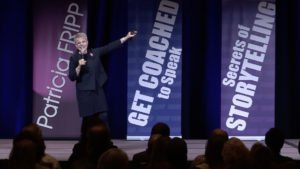Your Important Presentations Will Improve When You…
…improve your everyday casual conversations.
In your presentations, you will not improve what you are not aware of.
One excellent way to perfect your presentation is to record it and then listen carefully. This is more effective than simply looking over your written speech. Here are a few strategies I share with my executive speech coaching clients that you can use to improve your presentations.
Use visual shorthand.
Choose words that will create strong visual images in the minds of your audience members. Forget thinking in terms of formal parts of speech – pronouns, adverbs, verbs, etc. Think picture words and connecting words.
Be aware of how words create images.
Consider these words which all describe someone moving on their feet: “moved,” “ran,” “sauntered,” “staggered,” “skipped,” “raced,” and “meandered.” Your word choices can create strikingly different pictures.
Here is an example of a sentence from one of my coaching clients. She was a lawyer who told stories in her speech on Modern Day Slavery.
Before… “He promised her many things.”
Fripped… “He promised her a life of romance and adventure.”
Remove all clichés.
Clichés are words and phrases, once interesting, which have been overused. Clichés should be avoided because they weaken your message and cause your audience to tune out. Here are some examples for you to avoid:
“Think outside of the box.”
“Back to the drawing board.”
“Been there, done that, bought the tee-shirt.”
“Garbage in, garbage out.”
“It ain’t over till the fat lady sings.”
“Knock it out of the park.”
Remove your personal verbal “tics.”
These are your filler words and phrases that you include simply out of habit. They do not contribute to your message or your credibility. Examples include, “So,” “I mean,” “Right,” “You know what I mean,” “To tell the truth.”
Remove empty words.
Examples include, “Out there,” “At the end of the day.”
Improve your stories.
- Think chronologically.
- Use shorter sentences or phrases.
- Consider each visual scene.
Tell your story by creating a chronologically ordered series of brief vivid scenes.
A vivid example.
In January, Mark, a district sales manager from a biotech company, was preparing to moderate a panel at the Las Vegas National Sales Meeting.
He was nervous about his new role in front of the 100-person audience. In our pre-coaching communications, I noticed his email signature line included a quote about “moving fast.” He explained that he had a new role and was “moving fast” to understand new products, clients, and products.
His panel’s task was to encourage the audience to embrace new jobs in different areas and to realize that they would have to move fast to get up to speed in different roles in new territories.
Mark did not have any idea how to set the tone for the meeting. I asked, “What experience do you have with Las Vegas? “Mark said, “After last year’s sales meeting, my wife Tammy came in for the weekend. We went to see David Copperfield, and he made her disappear.”
Incorporating the three techniques make the script easy for Mark to remember.
Notice: I recommend that you write your script with one short sentence or phrase going down the page, not across as in a paragraph. In your rehearsal, this makes it easier for you to internalize.
“After last year’s sales meeting,
my wife Tammy came in for the weekend.
We went to see David Copperfield’s magic show.
Three-quarters of the way through his performance,
Copperfield threw two dozen balls into the audience.
Tammy caught one.
David said, “If you touched a ball, please come on the stage.”
He seated 24 people on bleachers and covered them with a tarp.
Whoosh! Five seconds later, they were gone!
Suddenly they appeared at the back of the room.
On the way out I asked Tammy, “How did he do it?”
She said, “We are sworn to secrecy. However, we did have to move really fast!”
Remember, the sales meeting was in Las Vegas, and Mark’s theme incorporated the importance of moving fast. He said, “The panel was a wild success, and everyone raved about my opening story!”
Listen to your recorded presentation and discover where you can make it clearer, sharper, and more eloquent.
Let m![]() e help you become a great presenter quickly, easily, and cost-effectively on your own schedule. I’m here for you 24/7 through Fripp Virtual Training.
e help you become a great presenter quickly, easily, and cost-effectively on your own schedule. I’m here for you 24/7 through Fripp Virtual Training.
“I wanted a super bowl-quality coach, and I was lucky to be introduced to Patricia Fripp. Her help in coaching and scripting was world-class. With Patricia Fripp on your team, you can go places.”
– Don Yaeger, Long-Time Associate Editor for Sports Illustrated magazine, Award-Winning Keynote Speaker, New York Times Best-Selling Author
Join FrippVT today!
Executive Speech Coach and Hall of Fame Keynote Speaker Patricia Fripp works with those who realize that powerful, persuasive presentation skills give them a competitive edge.
